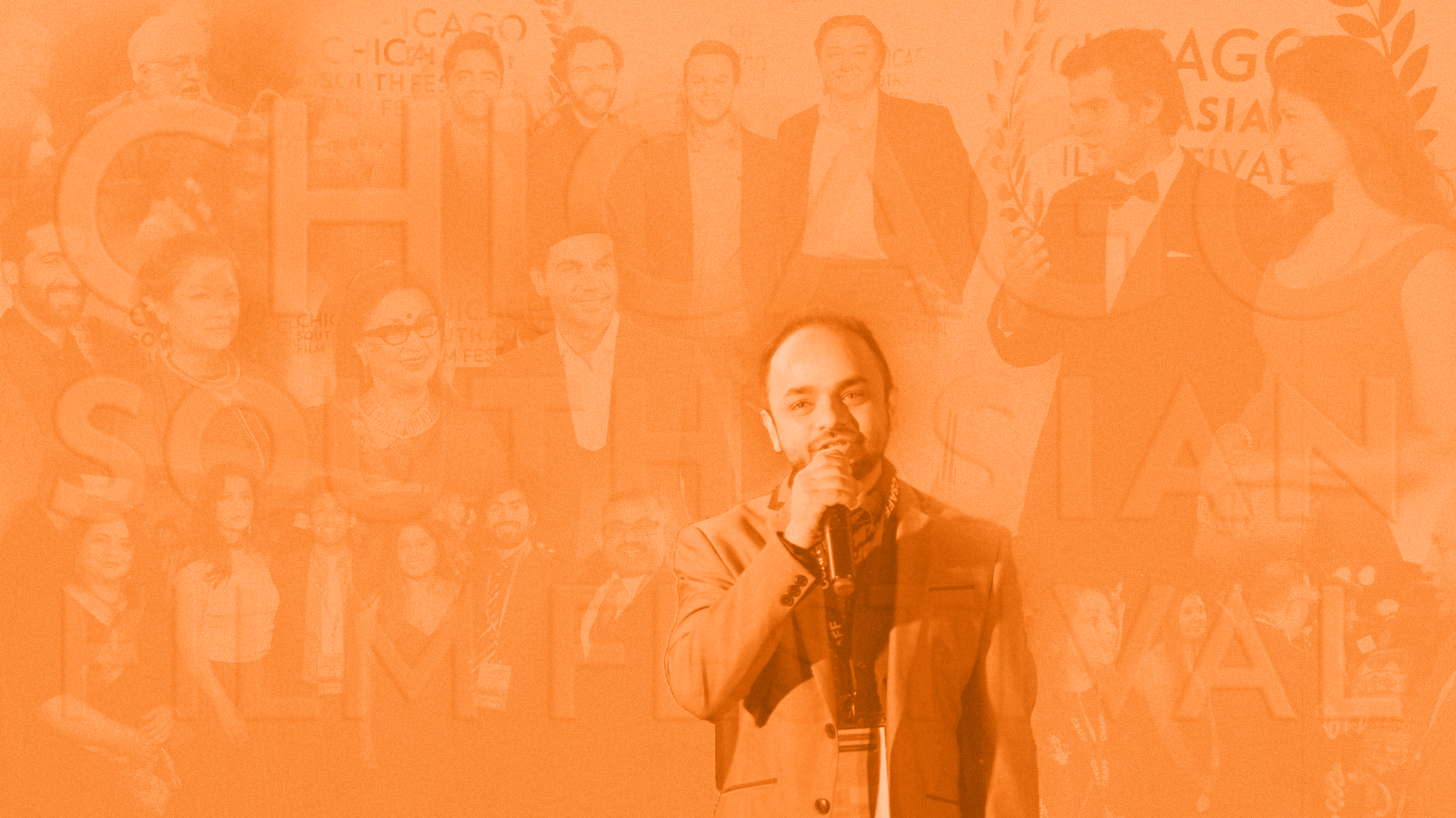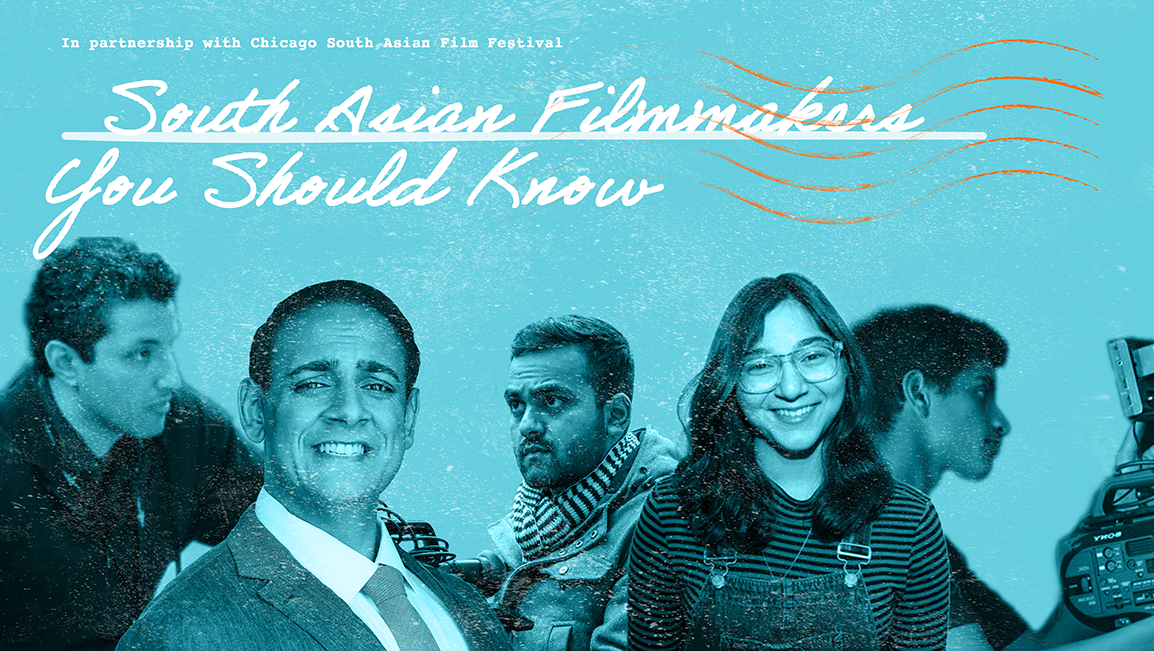Held at the Chicago Cultural Center and Columbia College Chicago, the inaugural event attracted just over 1,300 attendees, including renowned filmmakers Aparna Sen, Deepti Naval, and Ajay Naidu.

Festival Director Jigar Shah addresses the audience at an event.
“One of the things my parents told me was that ‘whatever we take from nature, we should always give back’,” says Jigar Shah.
Jigar Shah was born and raised in India. He emigrated when he was young, but when Jigar arrived in the United States, he soon began to realize that American culture featured very little representation of folks like him.
“I saw that there was a void of South Asian perception,” Jigar observes, “I thought about in what kind of ways South Asians here have been perceived?”
Throughout Hollywood’s history, South Asian characters have often been problematically reduced to stereotypes, like convenience store owners, cab drivers, or nerds. Furthermore, as evidenced by this Nielsen Report for the 2020-2021 TV season, representation especially affects South Asian women, accounting for only an abysmal 0.3% share of the screen across broadcast television.
Yet, Jigar remains optimistic about the future of Asian representation in media. Korean film Parasite took home the Oscar for Best Picture in 2019. In that same year, YouTube Personality Lilly Singh became the first-ever South Asian woman to host a late-night show. 2021 saw the debut of Kingo, a South Asian superhero, in the Marvel Cinematic Universe.
“The arena is changing,” Jigar notes. “Having that healthy conflict really sparks creativity in my mind to build something meaningful and unique, so that people understand what South Asia has to offer for the rest of the world.”
.

Jigar answers questions in an interview.
Jigar had always been a huge film buff. He’d always loved to engage with any form of art. So, when Jigar found himself moving to Chicago, he started exploring how he could fulfill his inner creative desires. Soon, he found himself as an audience member at the newly established Chicago South Asian Film Festival.
“I was blown away by the richness of the films’ creativity and the number of like-minded artists, filmmakers, or general community,” Jigar reminisces fondly. “It was always such a warm and homey feeling of going to the festival.”
Jigar had a friend who’d worked in the festival and was also tangentially acquainted with the festival founders - Ketki Parikh and Amit Rana. After his first screening, he made some connections, and soon he began working for the festival. Since then, he’s just never left.
Nowadays, Jigar is the Festival Director. He’s working hard to put together the 13th ever festival: selecting the films, curating the events, reaching out to filmmakers, and sparking meaningful discussions. The work is expansive, covering about twelve South Asian countries and giving voice to both the international South Asian film community and the local diaspora.
“The goal of the festival is to give voice to independent filmmakers who otherwise won't have a platform to showcase their work, as well as educate the community on societal issues,” Jigar concludes.

An audience member speaks at a festival-led discussion.
Intersectionality has been a large focus for the festival. It has been intentionally programming films discussing different genders, sexualities, and transnational borders, as well as addressing various forms of oppression that South Asian filmmakers face today.
“A lot of abuse has come to light in recent years,” Jigar observes, “and people are now coming forward and not shying away from bringing this out into the public.”
Carrying out this mission hasn’t always been easy. Jigar mentions how LGBTQ issues, for example, can be a very sensitive topic in the South Asian community, and how people tend to avoid talking about it. When asked about the potential difficulty in pushing the boundary of representation, Jigar nods solemnly.
“Some people weren’t as supportive about it because they felt that ‘hey, this is not what we represent. This is not what our culture is’,” he relates, “and for me, that was just mere ignorance.”
Yet, through the films Jigar programs at the festival, he hopes to show audiences that these identities exist within South Asian communities. In cultivating these unique spaces, Jigar hopes to spark these difficult conversations and for folks to learn and grow.

Photographs are taken of festival guests.
“My favorite memory was when we had almost six to seven, I would say, A-list celebrities who’d actually agreed to come to our festival,” Jigar recalls fondly, “and these are considered to be, like, the icons in their space.”
For Jigar, he’d initially thought that, given their celebrity status, these individuals would act accordingly. Yet, much to his delight, these guests couldn’t have been kinder.
“They were so open to talk to us as a community and the discussion was so genuine and real,” Jigar gushes.
He remembers that a lot of really tough questions came out during the course of the facilitated conversation. Jigar recalls there being a lot of emotional tension in that room, yet these famous talents readily jumped into having honest and productive discourse. Cultivating these safe spaces demonstrates one of the many ways which the festival gives back to the very community that’s been supporting it every year.
“The celebrities didn’t shy away from what they were and from being authentic in their view point,” Jigar emphasizes. “The real feelings came out.”

Audience members enjoy a screening.
The ongoing COVID-19 pandemic has drastically re-shaped the landscape of film festivals. With rigid quarantine guidelines in place, festivals were forced to re-evaluate their options and pursue virtual formats.
“In these tough times, we joined hands with six other film festivals in North America to form a coalition,” Jigar recounts, “and last year, together, we did a hybrid of a physical/virtual festival.”
Depending on the circumstances, Jigar hopes to be completely in-person by the next iteration of the festival from September 22nd to 25th.
“I think one of the themes that I constantly see (while) emerging throughout this process would be hope, resiliency, bold(ness), and fierce(ness),” he says.
With these four values in mind, Jigar is looking forward to returning to a physical festival. He strongly encourages South Asian filmmakers to begin submitting their own works and looks forward to programming for the next generation of filmmakers.

The team behind the Chicago South Asian Film Festival.
Interested in following along? Submit now to this year's festival! Check out the Chicago South Asian Film Festival’s social media pages, whether it be through Instagram, Twitter, or Facebook. Furthermore, you can sign up for monthly newsletter updates at www.csaff.org. Finally, for folks who’d like to volunteer for the festival, feel free to reach out directly at info@csaff.org.



